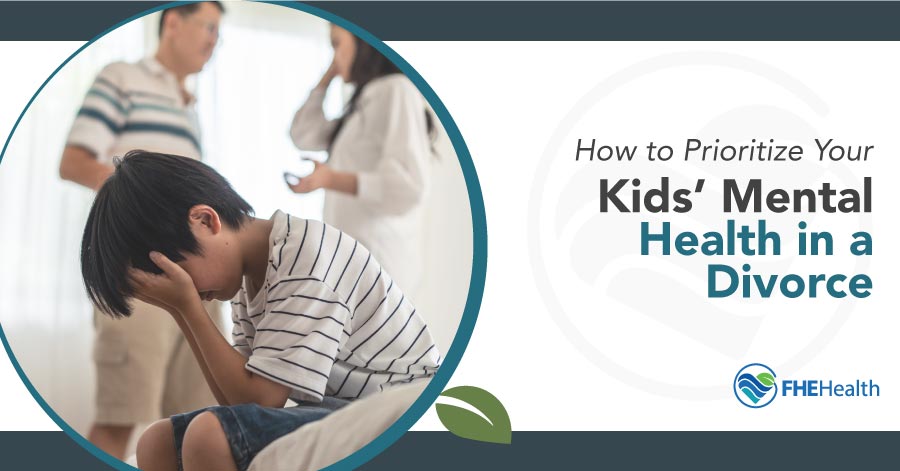
While divorce rates have been trending down in recent years, many children are still impacted by divorce. Even when it’s truly for the best, divorce can have a devastating effect on everyone involved, including the children. From dealing with sweeping lifestyle changes to having to split holidays, there’s virtually no part of life left unaffected after a divorce. And for children who may not understand the reasons behind a divorce or have the maturity to approach it from a different perspective, it can be especially difficult.
But this doesn’t mean there’s nothing you can do to help your children heal during and after a divorce. By keeping their mental health at the top of the priority list and seeking help from outside resources such as counseling, you can help your children navigate the difficulties of divorce. Keep reading to get information and tips on how to get started.
The Importance of Prioritizing Children’s Mental Health During Divorce
While divorce is a challenging event for everyone involved — and listed on the list of life’s major stressors — it can be especially difficult for children. This is because they often aren’t part of the many discussions and evaluations that happen between a married couple before divorce is an option. Many parents try to shield their children from those aspects — and rightfully so — but this can make it seem even more like a blindsiding change for kids.
To help make the transition as smooth as possible for your children, it’s important to take time for their mental health. Children may fare better when they’re allowed to ask questions and there’s open communication about what’s going on and what changes they should expect.
It’s also important to check in on your kids during this time, even if they aren’t coming to you first. Many children may internalize the things happening around the divorce or blame themselves. Making it a point to check in with your child and ask how they’re doing and what they’re feeling can ensure you’re providing those opportunities and showing you’re still invested in the family, even if the parents aren’t going to be together.
How Does Divorce Affect Children, and What Happens If It’s Not Addressed?
While it’s true that divorce is linked to some negative outcomes in children, such as an increased risk of substance abuse, anxiety, and depression, it’s not clear whether this is due directly to divorce or to how the divorce itself is handled. Divorce can cause feelings of insecurity, guilt, anger, sadness, and even grief for children, and if these aren’t addressed quickly and appropriately, it can increase the risk of mental health issues going forward.
3 Practical Tips for Prioritizing Kids’ Mental Health
Check out the three tips below for suggestions on how to prioritize your children’s mental health during and after a divorce.
1. Keep Communication Open
Talking with your children about your divorce can seem a little awkward at first, but the discussion is important, and it’s not one that only happens once. Once you’re sure divorce is the only option, it’s a good idea to sit down with your kids — ideally with both parents present — and explain what’s happening. This gives you the chance to set the tone moving forward and lets your children know that even though your marital status is changing, you’re all still a family.
Older children may not have any questions or react to the news at all, but it’s important to keep following up. They may need some time to process things or see how the dynamics change before they’re ready to talk.
2. Present a United Front
One of the best ways to protect your children’s mental health is to give them a sense of security and family that exists outside of their parents being married or everyone living in the same household. You can encourage this by working to have a positive co-parenting relationship with the other parent. This looks a little different for every family but might include things like attending sports games, sitting together at recitals, and making joint decisions about the children’s welfare and needs.
If you’re struggling to have a positive relationship with your ex after a divorce, that’s normal. But putting in the effort to figure out what the new normal looks like and how to move forward as parents is worth it for everyone’s sake.
3. Seek Professional Help
Even when you do everything you can to help your children positively work through divorce, some children still have difficulty adjusting or aren’t willing to open up to their parents. This is where a professional can help. A therapist can give your child a safe place to express their emotions and get an outside perspective, which can be especially valuable during divorce when everyone in the family is so close to the change.
Family therapy can also be very helpful in getting everyone on the same page and encouraging open communication throughout the family unit. Many parents also find it helpful to go through counseling on their own during and after a divorce so they have a place to unpack what’s happening and deal with co-parenting conflicts outside the children’s awareness.
While keeping your children’s mental health at the forefront is important, it’s also vital to ensure you focus on your own mental health as well. Deciding to get a divorce is a difficult decision that comes with many emotions and a great deal of stress. Whether you’re contemplating a change in your family circumstances and want to find out how divorce affects children or you’ve already signed the final paperwork and need help navigating the aftermath, speaking with a therapist can make a difference. Call (833) 596-3502 today to find out how our team at FHE Health can help.






